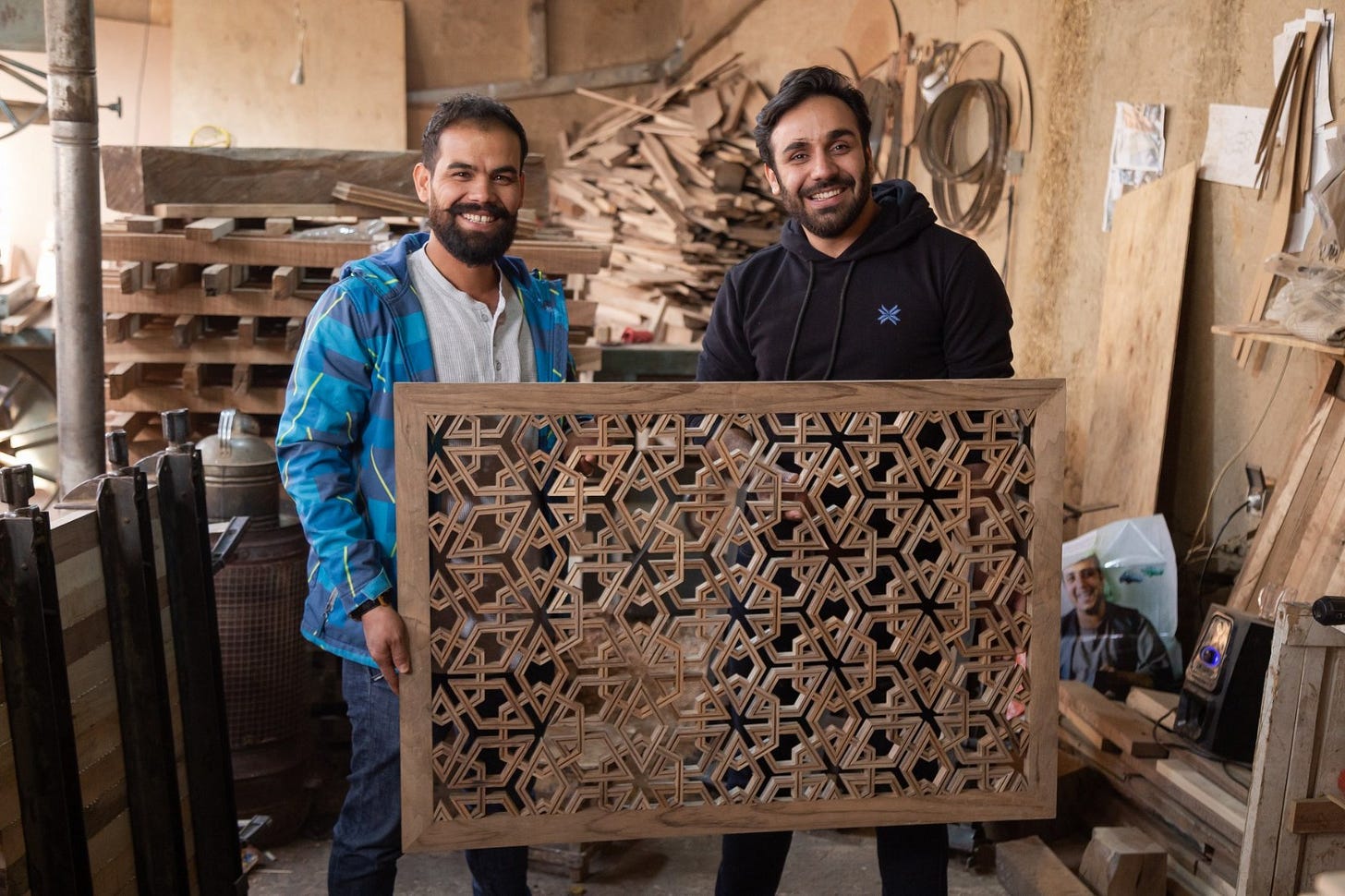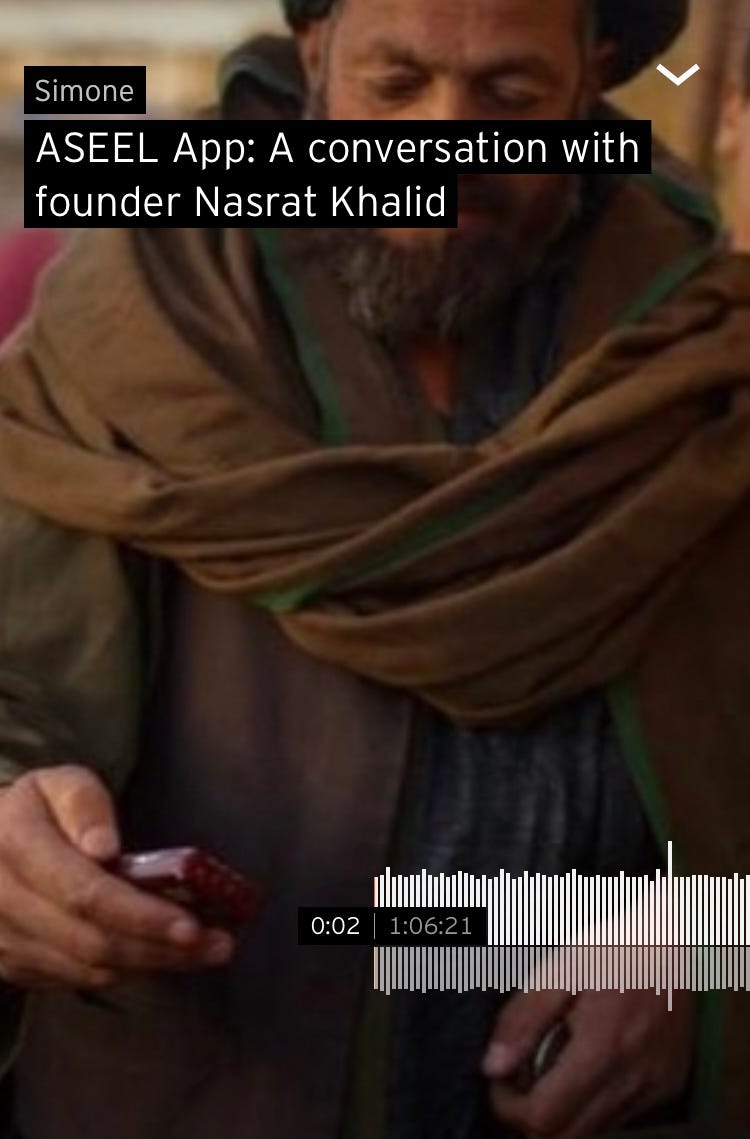ASEEL: How Startups in Afghanistan are Navigating an Uncharted Humanitarian Crisis
Nearly seven months after Afghanistan was seized by Taliban — Afghan startups are leading a new terrain of humanitarian response internationally. I spoke with ASEEL founder Nasrat Khalid to learn more.

From a young age he dreamt of running a technology company in Afghanistan. Nasrat Khalid launched ASEEL App in 2018 an integrated e-commerce platform for Afghan artisans to sell products in various Afghanistan provinces with the option of international exposure to sell work. Born in Logar, Nasrat, spent most of his life in Pakistan around refugee camps knowing he would go back to Afghanistan. He developed an interest in computers at a young age eventually teaching courses in Afghanistan anything from basic HTML to software development later partnering with University of Afghanistan. “Growing up my mother was always involved in education especially for Afghan girls and women. Post 9/11, we would visit Afghanistan ever so often. I loved teaching it was more quantifiable. I was around eighteen when I had my first teaching job at Afghanistan Technical Vocational Institute — many students in Afghanistan wanted new opportunities so they pursued education. Computer science is an option for a new path in Afghanistan.” Nasrat told me on a phone call from El Paso.
DURING OCTOBER I began speaking to an alumni from University of Afghanistan and former law student about life after Taliban takeover. As the months passed with no closure on evacuation, unanswered IRCC applications, and an endless stream of Taliban house searches, I learned Zikria was volunteering with an e-commerce platform called ASEEL since the start of January while unable to leave Afghanistan. “You can donate to ASEEL to help Afghans anywhere from all over the world. When the donation reaches to the intended recipient you will get pictures and bills that a package was donated. A donor can let ASEEL decide who the donation will go to or you can buy a package and provide a beneficiary detail. ASEEL will then deliver the package.” Zikria told me while sending photos of receipts.
Intrigued, I wanted to learn more. As a result I recorded an audio interview detailing Nasrat’s journey as a founder here.

Recently featured in TIME magazine ASEEL app has become one of the most visibly online Afghan startups to maneuver the challenging task of delivering aid packages to Afghans dealing with hunger as millions in Afghanistan adapt to a life under Taliban rule. Nasrat put me in contact with ASEEL’s distribution lead Ishan Hasaand to explain the dynamic shift from exporting local Afghan artists work on the international stage to how ASEEL volunteers are working to solve a hunger crisis in a heavily sanctioned Afghanistan.
Taylor Simone: How did you become involved with ASEEL?
Ishan Hasaand: I heard about ASEEL while I was working at Lincoln Learning Centre via Kabul University. I heard wonderful stories. I was astonished by the innovative vision they had for Afghanistan. What drew my attention is how local Afghan vendors who produce handmade quality products who originally didn’t have access to international markets were able to sell work globally. To bring those Afghan vendors on one platform to help them sell their products internationally contributed to the overall growth of the platform. One of ASEEL’s missions is to create over ten thousand jobs for Afghans.
TS: With the current humanitarian conditions of Afghanistan, can you walk me through some daily responsibilities with your role in distribution for ASEEL?
IH: With the current severity of the situation in Afghanistan, we identify Afghans who are in need by a network called Atalan [Atal refers to volunteer]. We recruit Afghans for registry and note their Omid IDs. After we plan out distributions for food aid packages and other humanitarian supplies. Final step is to ensure every beneficiary receives food aid package alongside Omid ID.
TS: What are Omid IDs? Does Atalan network involve an outreach role? Does your team talk to Afghans on-ground or mainly remote? How many provinces and districts does ASEEL operate in? How do Afghans hear about ASEEL?
IH: Omid IDs are IDs which a beneficiary receives after filling out the beneficiary form. Through this ID, all info will be kept in our database. When someone has an Omid ID who is trying to reach out to us, he or she doesn’t need to share all their information, they can tell us Omid ID number and the package will be delivered. Omid IDs help ensure the process of distribution is efficient.
We talk to Afghans in person and remotely. When there is a bulk distribution our team must be there. We created the Atalan network to make everything automated. The purpose is to identify the most needy families, make a story, and finally get them packages. On a daily basis, we reach out to Afghans and families. Atalan network is expanded to twenty five provinces in Afghanistan. Soon, we will be able to create teams all across the country. Every province has a team lead if they're volunteering, we divided it in five zones to cover those twenty five provinces. We have high distribution in Kabul, Kandahar, and Mazar.
How Afghans hear about our work is either social media or by informing eachother.
TS: What are the greatest challenges your team is facing now with distribution?
IH: Since Taliban takeover, a prominent challenge is we could have over a hundred orders of packages for families. However, we could be in a district where the number of those in need is much higher who aren't yet registered for distribution. That's why we created Atalan network to helps us track those distributions. We use those scenarios to help recruit Afghans for registry. [Taliban] do ask questions when entering provinces so we remind them this is charitable work.
Our approach varies. We have international donors who want to help those in Afghanistan which is excellent it's incredible to see this scale of co-operation.
It’s critical we get those packages within 48 hours.
The challenges of humanitarian response in Afghanistan remain imminent. Yet, Nasrat continues to bring his vision to new listeners in Silicon Valley to hear the story of ASEEL: “Afghanistan is facing a very complex set of interconnected issues. What really happened is everything stopped it wasn’t solely government collapse. I think this is a moment for those in Silicon Valley to take notice on what is sensible in a humanitarian situation. We know technology can provide some of those answers — it gives me confidence we could sell artisans work in Turkey, and quickly implement an emergency response in Afghanistan.”
Nasrat Khalid is currently travelling all over the US to raise for a series of funding rounds.
Taylor Simone is a freelance journalist and film professional crewing for Vancouver’s motion picture industry specializing in conflict resolution, privacy, data, and reporting. Her public and private work has appeared in VICE, Georgia Straight, Arsenal Pulp, Rabble, and others.
She’s dispatched for Supernatural, Riverdale, Batwoman, Chilling Adventures of Sabrina, Nancy Drew, DC Legends, The Flash, Superman & Lois, Firefly Lane, Motherland, Zoey’s Extraordinary Playlist, Away, Mighty Ducks, Jurassic World: Dominion, The Adam Project, Yellowjackets, Big Sky, The Stand, The Mother, & dozens more…
Sig. taylorsimone@protonmail.com
Click for pitching guidelines.

